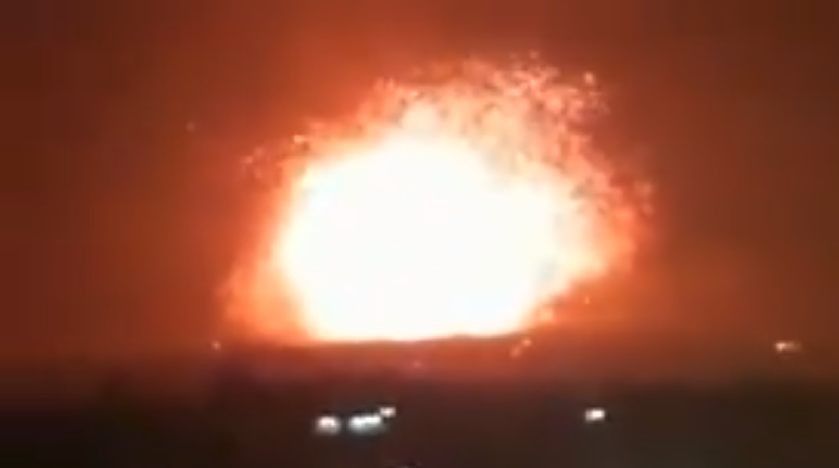Iranian missiles destroyed in 'bunker busting' Syria strikes: Report

Missile attacks on Syrian government-held airbases overnight struck several arms depots, including some holding surface-to-surface missiles that Iran was preparing to deploy, according to reports.
Al-Akhbar, a Lebanese pro-Hezbollah newspaper, said the attacks in Hama and in the Aleppo countryside were apparently carried out with "bunker-busting" missiles, causing huge explosions which Syrian state television said caused a 2.6 magnitude earthquake.
The origin of the attacks has not been confirmed, however it comes weeks after Israel bombed the T4 airbase in Syria and days after the defence minister, Avigdor Lieberman, said Israel would attack Iranian assets in Syria if they were deemed a threat.
The Israeli military said soon after the latest bombing raids that it did not comment on foreign reports and had no information at this time.
According to the Syrian army, the strikes targeted a base in Aleppo province and Salhab aiport, Hama, where the 46th Syrian army brigade and Iranian "consultants" were stationed. The blast at Hama sent a huge fireball into the air.
The Israeli newspaper Haaretz said "assessments" showed major arms caches, including Iranian surface-to-surface missiles, had been destroyed in that attack.
But Iran's Tasnim news agency said on Monday that reports of Iranian casualties were baseless and no Iranians had been killed in the attacks.
"All these reports over an attack on an Iranian military base in Syria and the martyrdom of several Iranian military advisers in Syria are baseless," an unnamed source told Iran's semi-official Tasnim news agency.
The Syrian army said late on Sunday that "enemy" rockets had struck several military bases in the Hama and Aleppo countryside in what it said was a new "aggression" by its enemies, state television said.
Syrian state television said the missile attacks took place at 10.30pm local time. Successive blasts were heard in rural Hama province and authorities were investigating the cause.
Israel has previously hit Iranian-backed militia outposts in Syria, mainly targeting arms convoys of the Iranian-backed Hezbollah. Israel regards the group, which is fighting alongside President Bashar al-Assad, as the biggest threat on its borders.
Earlier this month it struck a Syrian air base, killing seven Iranian personnel. Israel has warned it could hit Iranian bases in the war-torn country should tensions with Tehran escalate.
The Observatory said a Syrian army base was hit near the city of Salhab, west of Hama, where Iranian forces are also stationed.
It also said rockets hit Syrian government bases in the region surrounding Nairab military airport, which is close to Aleppo International Airport.
Israeli military spokesman Lieutenant Colonel Jonathon Conricus told Reuters: "We don't comment on foreign reports and we have no information at this time."
On Sunday, the Israeli defence minister, Lieberman, said Israel would maintain freedom of operation in Syria, Haaretz reported.
“We have no intention to attack Russia or to interfere in domestic Syrian issues,” Lieberman said at the annual Jerusalem Post conference, according to Haaretz.
“But if somebody thinks that it is possible to launch missiles or to attack Israel or even our aircraft, no doubt we will respond and we will respond very forcefully,” Haaretz quoted him as saying.
In February, Israel said it launched multiple air strikes against air defences and Iranian targets inside Syria. Among the targets was the T4 airbase, after it said it had intercepted an Iranian drone on the Syria-Israel border.
Stay informed with MEE's newsletters
Sign up to get the latest alerts, insights and analysis, starting with Turkey Unpacked
Middle East Eye delivers independent and unrivalled coverage and analysis of the Middle East, North Africa and beyond. To learn more about republishing this content and the associated fees, please fill out this form. More about MEE can be found here.




